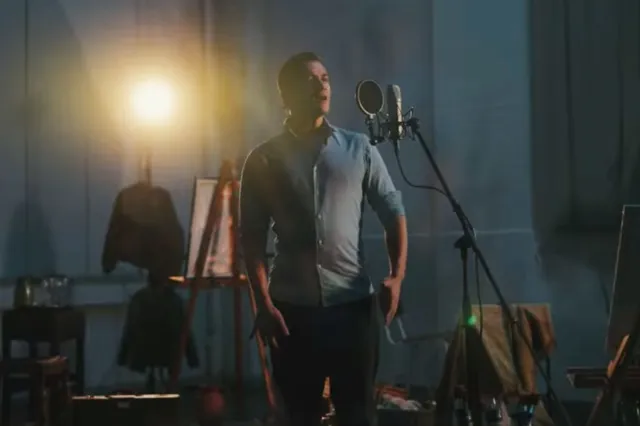Review Round-up: Critics Assess the State of Nation
The National Theatre’s family Christmas shows have been one of the undoubted successes of Nicholas Hytner‘s tenure as artistic director, with His Dark Materials, Coram Boy and War Horse proving critical and commercial successes.
Set in a parallel world fashioned on the South Pacific during the 19th century, Nation tells the story of two teenagers – Mau and Daphne – who, having survived a cataclysmic volcano, must rebuild their island, ‘The Nation’. While Mau learns bravery and becomes a man, Daphne delivers a baby and milks a pig – but just as the party is really getting started, the remnants of Victorian society step in to put new order in place.
Director Melly Still co-designs alongside Mark Friend, while the cast is led by Gary Carr as Mau and Emily Taaffe as Daphne. Nation continues in rep until 28 March 2010.
Critically, it’s fair to say that, following the likes of Coram Boy and War Horse, Nation proved something of a disappointment. Though it certainly had its fans – Charles Spencer of the Daily Telegraph foremost among them – most overnight reviews were decidedly lukewarm. The principal bugbear seemed to be the “stuttering” and “confusing” nature of the narrative, even though most were quick to praise the “five star” design elements. The cast, although they didn’t attract a huge amount of critical attention, were mostly applauded, with Jason Thorpe‘s “foul-mouthed parrot” emerging as the show-stealer.
Michael Coveney on Whatsonstage.com (two stars) – “There’s a strong sense of trying to find a new His Dark Materials, or Coram Boy, in Mark Ravenhill’s dutiful adaptation of Terry Pratchett’s fleet but facile novel of democracy under pressure in the parallel world of a South Pacific island. The ingredients in Melly Still’s fitfully spectacular production are promising enough, with the exploratory British boat washed up on a devastated island of dead ancestors and flying dolphins: a flurry of leaves rise to the top of the Olivier and are instantly transformed into film imagery … The story-line is stuttering by the time there’s a breakaway insurgence led by Paul Chahidi’s vengeful butler, resulting in a fight with Mau in a small boat threatened by waves and sharks: a tumble overboard is followed with a downward plunge on the big transparent screens that surround the design by Still and Mark Friend … But there’s no real momentum in the show, which veers towards self-parody, with disappointing music and a lot of foot-stomping. Terry Pratchett says he saw his book as scenes in a cinema as he wrote it. I did, too, as I skimmed its pages, but the stage reality remains earthbound and unmoving.”
Paul Taylor in the Independent (three stars) – “Melly Still‘s production occasionally creates ravishing visual effects with its three large picture-framed aquaria which swarm with scene-setting video footage or fill with suspended, tumbling figures for the underwater passages or purl with blood during moments of violence … The tsunami seems to cure Mau tout court of any fundamental belief in the patriarchal gods of his tribe and his rite of passage into the assumption of responsibility as adult head of his nation is insufficiently pitted with deep dilemmas, despite the need to protect his people from cannibalistic marauders without the support of religion. Meanwhile, irritating Daphne progresses too smoothly from patronising tea ceremonies, via queasy cultural trials that are reminiscent of I’m A Celebrity, Get Me Out of Here (a programme on which no one, as yet, has had to suck the teats of a drugged pig to nurse an infant) to squawky consciousness-raising about the tribe which she estimates had discovered astronomy thousands of years ago while Europe was still under an ice-cap … But a lot of the show, with its banal grass-skirted song and dance and its civic studies slogans set to a bad Hair day score, lapses too easily into pious proclamations … Nation is spectacularly designed but altogether too designing.”
Michael Billington in the Guardian (two stars) – “You could see it as a Tempest-like story of cultural collision in which Mau is forced to acknowledge his nation’s lost historic glories. Or it could be a modern Coral Island about a displaced adolescent’s adjustment to the world of nature. It might also be about the human urge to overcome death embodied, on the island, by Locaha and, in the Victorian world, by a Russian flu pandemic. But what you get on stage is a loose congregation of myths that boils down to a series of set-pieces: Mau confronting a shark, Daphne making a Dantesque journey into the underworld and both of them learning to kill. What the story lacks is the spellbinding clarity you find in the best children’s fiction. It is all staged with a hectic panache. Sill and her co-designer, Mark Friend, have created a stage dominated by three translucent screens through which we glimpse floating corpses, swimming dolphins, predatory man-eaters. Puppets, created by Yvonne Stone, represent a giant sow, bendy-limbed elders, even a growing baby. Gary Carr and Emily Taaffe as Mau and Daphne disport themselves with great dignity and there is a nice study of a talking, walking parrot from Jason Thorpe.”
Benedict Nightingale in The Times
(three stars) – “Judging by the cheers that greeted the
curtain, the show can more safely be recommended than (say) the average
Treasure Island or Aladdin; but the narrative can be confusing, the political correctness irksome, and much else as wishful and sentimental as, well, Treasure Island or Aladdin. Mark you, the director-designer Melly Still’s production is often as visually captivating as her Coram Boy.
There’s a bit too much gleeful prancing in grass skirts by
chorus members wearing headdresses that make them look like totem poles
on speed, but, as my neighbour sagely remarked, the first scene plays
half a dozen variations on The Tempest
… Another problem is what, for want of a less pretentious
word, I’d call the show’s metaphysics. Science and
reason are much fêted, yet magic keeps resurfacing, whether
in the form of a lady witchdoctor or ghostly ‘grandfathers’ who hobble
about in winding sheets using tusks for crutches. Still, for all the
confusion, the visual impact is considerable, and might be more so if
there were more use of pretend birds, lurching pigs and other puppetry.
Another War Horse this might possibly have been. Another War Horse it isn’t.”
Charles Spencer in the Daily Telegraph (four stars) – “Mark Ravenhill’s adaptation of the novel, and Melly Still’s production which faces formidable challenges in bringing storms, giant waves, shipwrecks, and wildlife ranging from a foul-mouthed parrot to an enormous pig to the stage, isn’t in quite the same league as War Horse. There are moments when the South Sea Islanders singing and dancing in their grass skirts resemble the kind of cabaret act you might encounter in a five star Hawaii hotel; the puppetry seems crude in comparison to War Horse; and Adrian Sutton’s music is both undistinguished and instantly forgettable. But there are some stunning underwater sequences and more importantly a script by the usually abrasive Ravenhill that captures Pratchett’s noble mixture of humour and human sympathy … Gary Carr powerfully captures the desolation, the courage and the increasing wisdom of Mau. Emily Taaffe is both amusing and touching as the 13-year-old English aristocrat who puts a grass skirt over her crinoline, and a strong supporting cast bring both the islanders and the English colonials to vivid life.”
Quentin Letts in the Daily Mail (one star) – “Nation has several coups de theatre. What it lacks is a gripping, easily understood narrative to give audiences a festive treat. As for anything seasonal, well, you would not expect that from the National’s director Nicholas Hytner. This is but the latest in a series of anti-Christian plays staged under the Hytner regime. You cannot fault the man for consistency … We are shown vividly staged scenes about the natives’ mumbo-jumbo religion – which we are clearly invited to equate with Christianity. There are imaginatively depicted underwater scenes, colour-blind casting of whites as Polynesians, and some laughably C-grade songs which would barely pass muster as the bedtime number on the BBC’s CBeebies channel for toddlers … I hoped the arrival of some puppet vultures and a puppet baby was the low point but then Daphne, using her Western medical knowledge, set about solving the islanders’ health problems – and during one song cheerfully amputated a man’s leg. Saw, saw, saw in time to the music. With its pale-faced gods of death, sharks, blood and dark birds of doom, this sometimes boring show, which is aimed at children aged ten or more, will merely give little ones nightmares. The whole thing seems horribly misconceived, owing more to clumsy propaganda than Yuletide entertainment.”
Henry Hitchings in the Evening Standard (three stars) – “While in Mark Ravenhill’s adaptation there are moments of spry comedy and gorgeous spectacle, there are also times when one feels as if one’s watching a hastily devised school play … There are echoes of The Tempest, and of other classic desert island dramas … But the story is actually pretty slight, and its unfolding manages the unusual feat of being both glib and confusing … The highlights of Melly Still’s production are the fabulously rich design she has created with Mark Friend, which incorporates Yvonne Stone’s sinister puppets and dreamlike projections by Jon Driscoll and Gemma Carrington … The performances are wholehearted. As Mau, Gary Carr is muscular and engaging, while Emily Taaffe endows Daphne with presence, though she’s a touch strident. As the naughty parrot, Jason Thorpe is an enjoyable mosaic of mannerisms … In the end it’s the five-star design that redeems a production rather short of moral and emotional heft.”












